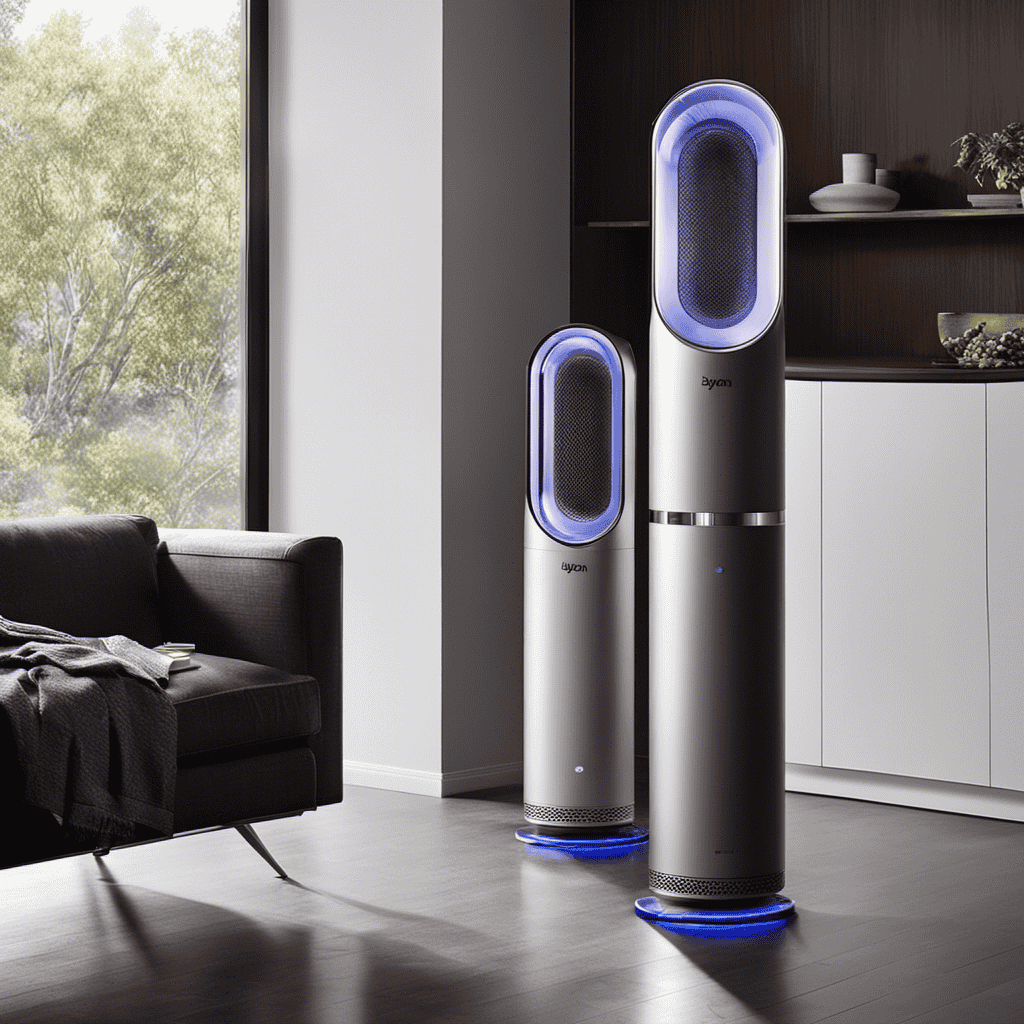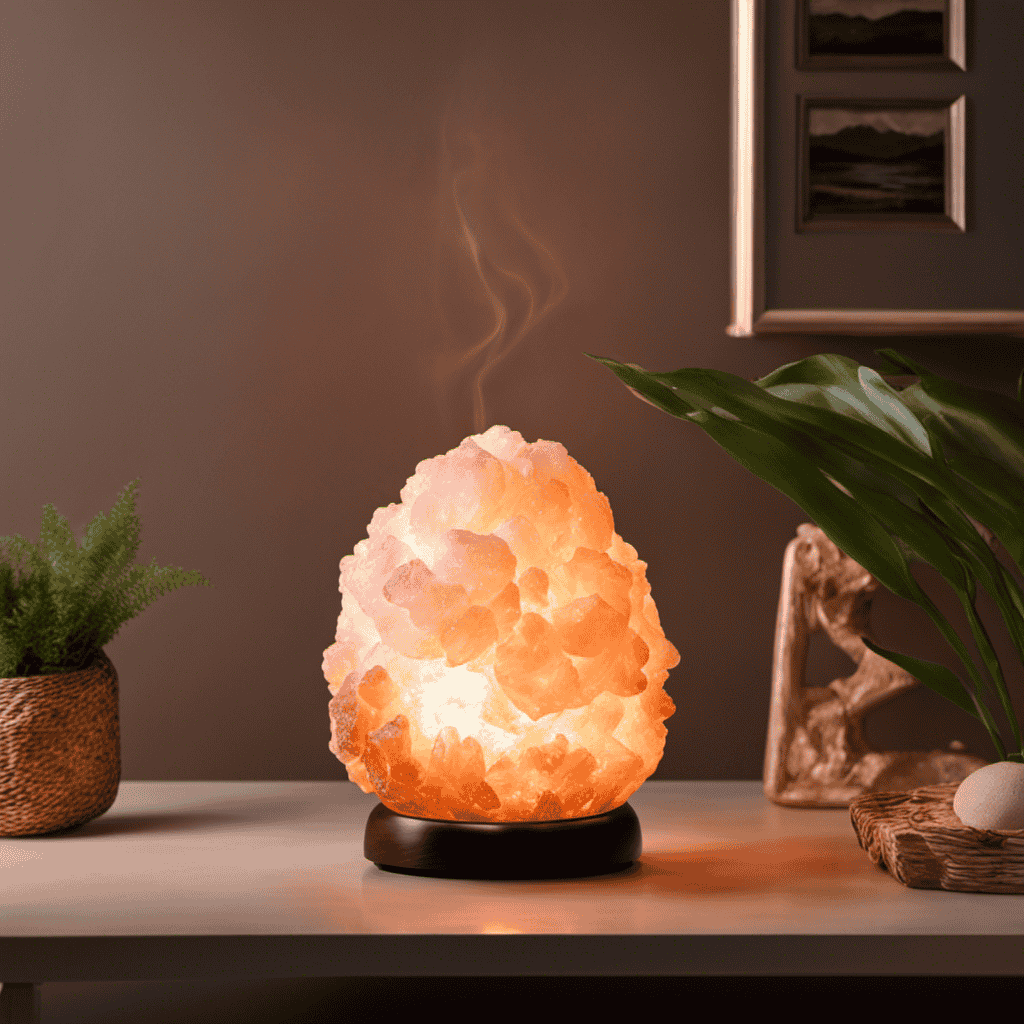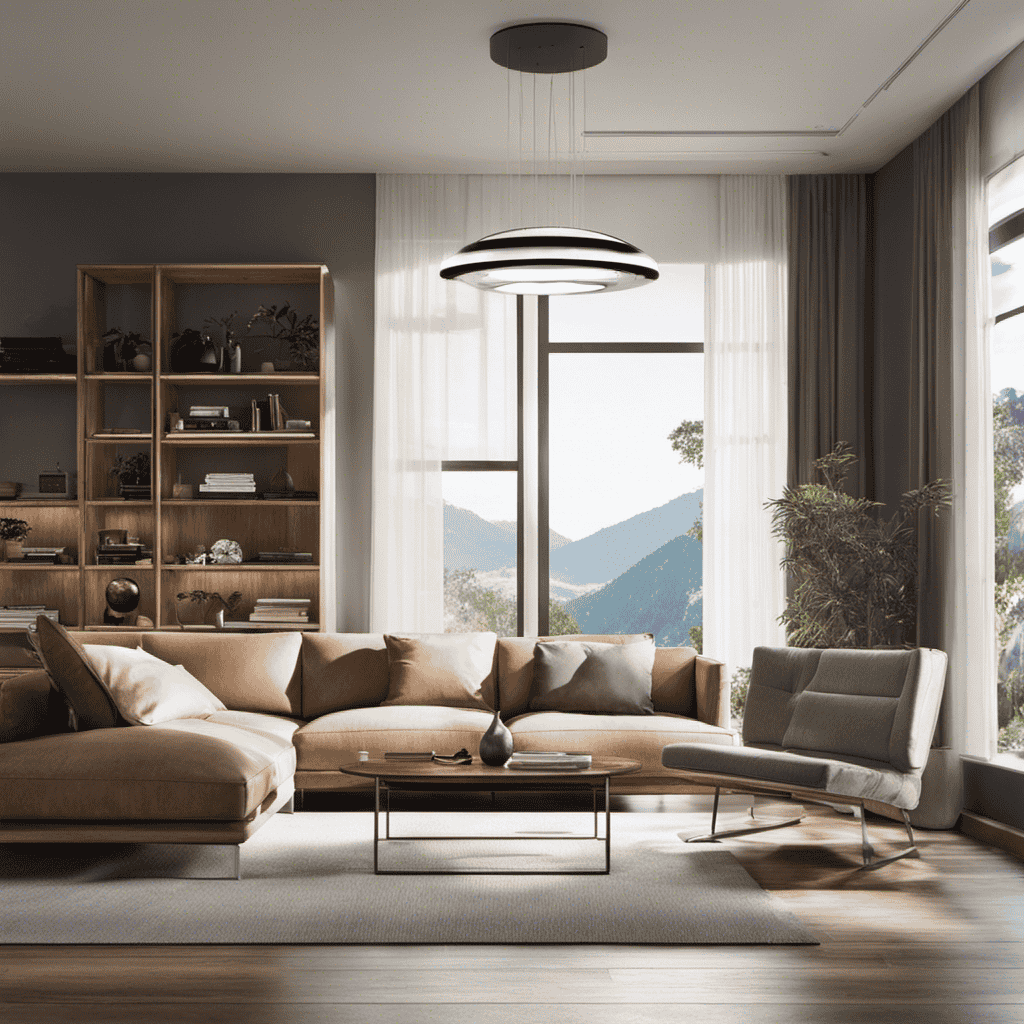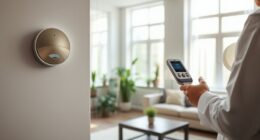I set out on a quest to compare the Dyson Air Purifier with other leading air purifiers, as a curious consumer looking for the best option for my home.
In this comprehensive analysis, I will delve into the performance, design, filter efficiency, noise level, energy consumption, price, and value of the Dyson Air Purifier.
By examining the data objectively, I aim to provide you with an informed perspective, helping you decide if this purifier lives up to its reputation.
Key Takeaways
- Dyson air purifiers consistently rank high in air quality measurement and outperform other brands in terms of performance and air purification capabilities.
- The sleek and modern design of Dyson air purifiers adds elegance to any space, while their compact and portable nature allows them to fit seamlessly into any room.
- Dyson air purifiers are equipped with advanced filtration technology, including HEPA and activated carbon filters, to thoroughly purify indoor air by eliminating allergens, bacteria, and odors.
- Dyson air purifiers are praised for their whisper-quiet operation and advanced noise reduction technology, making them ideal for bedrooms, offices, and quiet spaces.
Performance Comparison
The Dyson air purifier performs better than other brands on the market. When it comes to air quality measurement, the Dyson air purifier consistently ranks high. In independent tests, it has been shown to effectively remove pollutants and allergens, providing cleaner air for the users.
One of the reasons why the Dyson air purifier stands out is its advanced filtration system, which includes a HEPA filter and activated carbon filter. This combination allows it to capture even the smallest particles and eliminate odors.
The customer reviews also reflect the superior performance of the Dyson air purifier. Many users praise its ability to improve air quality and alleviate allergy symptoms.
Overall, the data and customer feedback clearly demonstrate that the Dyson air purifier outperforms other brands in terms of performance and air purification capabilities.
Design and Features Analysis
When considering the design of the air purifier, there are several sleek design advantages that make it stand out.
Not only does the modern and minimalistic design blend seamlessly with any room decor, but it also takes up minimal space.
Additionally, the innovative filtration technology ensures that the air in your home is not only clean but also free from allergens and pollutants.
Sleek Design Advantages
With its sleek design, you’ll love how the Dyson air purifier effortlessly complements any room decor.
Here are some advantages of its aesthetic and space-saving design:
-
Modern and minimalistic look: The Dyson air purifier features a sleek and contemporary design that adds a touch of elegance to any space. Its clean lines and polished finish make it a stylish addition to your home or office.
-
Compact and portable: The compact size of the Dyson air purifier allows it to fit seamlessly into any room without taking up much space. Its lightweight design also makes it easy to move around and place wherever you need it the most.
-
Versatile placement options: The Dyson air purifier is designed to be versatile when it comes to placement. Whether you prefer to place it on a tabletop, mount it on a wall, or keep it on the floor, it offers flexibility to suit your specific needs.
Innovative Filtration Technology
Featuring innovative filtration technology, the Dyson air purifier effectively removes pollutants from indoor air. Dyson has always been at the forefront of air purification advancements, constantly pushing the boundaries of filter technology. Their air purifiers are equipped with advanced filters that capture particles as small as 0.1 microns, including allergens, bacteria, and odors. The filtration system consists of a pre-filter, a HEPA filter, and an activated carbon filter, ensuring thorough purification. These advancements allow the Dyson air purifier to efficiently eliminate harmful pollutants, creating a healthier and cleaner indoor environment.
With their commitment to innovation and quality, Dyson continues to set the standard for air purification. Now, let’s delve into the fascinating world of filter efficiency evaluation.
Filter Efficiency Evaluation
The Dyson air purifier’s filter efficiency is comparable to other leading brands. It effectively captures and removes pollutants such as dust, allergens, and pet dander, ensuring cleaner and fresher air in your home.
When it comes to air quality assessment, the Dyson air purifier performs exceptionally well.
In terms of cost effectiveness comparison, the Dyson air purifier offers great value for money. Its filter life is longer compared to other brands, reducing the need for frequent filter replacements. Additionally, it consumes less energy while maintaining high filtration performance, resulting in lower electricity costs.
With its impressive filter efficiency and cost effectiveness, the Dyson air purifier is a solid choice for those looking to improve their indoor air quality.
Noise Level Assessment
When it comes to air purifiers, noise level is an important consideration for many users.
In this discussion, we will explore the topic of quietest air purifiers and the technology used to reduce noise.
Quietest Air Purifiers
You’ll appreciate how quiet the Dyson air purifier is compared to other models. When it comes to air purifier brands, customer reviews play a crucial role in determining the best options.
Here are a few reasons why the Dyson air purifier is regarded as one of the quietest models on the market:
-
Advanced noise reduction technology: Dyson has incorporated innovative engineering techniques to minimize noise levels during operation.
-
Customer testimonials: Numerous satisfied customers have praised the Dyson air purifier for its whisper-quiet operation, making it ideal for bedrooms, offices, and other quiet spaces.
-
Independent tests: Third-party tests have consistently shown that the Dyson air purifier produces significantly lower noise levels compared to its competitors.
With its quiet performance and positive customer feedback, the Dyson air purifier stands out as a top choice for those seeking a peaceful and efficient air purification experience.
Noise Reduction Technology?
One reason the Dyson air purifier is considered one of the quietest models is because of its advanced noise reduction technology. Dyson has implemented soundproofing techniques and acoustic insulation to minimize the noise produced by the purifier. This ensures a peaceful and undisturbed environment in your home or office, allowing you to enjoy clean air without any distractions. The table below highlights some of the key features of Dyson’s noise reduction technology:
| Feature | Description |
|---|---|
| Soundproofing | Utilizes materials and design elements to absorb and block sound waves, reducing overall noise levels. |
| Acoustic Insulation | Incorporates specialized insulation to prevent the transmission of sound, further minimizing noise emissions. |
| Low Vibration Motor | Engineered to reduce vibrations, which can contribute to noise production. |
| Airflow Optimization | Optimized airflow path to minimize turbulence and turbulence-related noise. |
| Noise Reduction Mode | Offers a dedicated mode that further reduces noise output for enhanced quietness. |
Energy Consumption Comparison
To compare energy consumption, let’s take a look at how the Dyson air purifier stacks up against other models. The Dyson air purifier stands out with its innovative technology and energy-saving features. Here are three reasons why it excels in this area:
-
Smart Sensors: The Dyson air purifier utilizes smart sensors to detect air quality and adjust its operation accordingly. This ensures that it only consumes the necessary amount of energy to maintain a clean and healthy environment.
-
Energy Efficient Motor: Equipped with a powerful yet energy-efficient motor, the Dyson air purifier can deliver high-performance air purification while minimizing energy consumption.
-
Sleep Mode: The Dyson air purifier offers a sleep mode feature that reduces energy usage during nighttime operation. This not only saves energy but also ensures a peaceful and undisturbed sleep.
Price and Value Comparison
When considering price and value, it’s important to weigh the features and benefits of different air purifier models.
In terms of cost effectiveness, Dyson air purifiers may have a higher upfront price compared to other brands, but they offer long term benefits that make them a worthwhile investment.
Dyson air purifiers are known for their advanced filtration systems, which capture particles as small as 0.1 microns, including allergens and pollutants. This can result in improved air quality and reduced health issues in the long run.
Additionally, Dyson air purifiers often come with additional features such as Wi-Fi connectivity and smart sensors, allowing users to monitor and control the device remotely.
While the initial price may seem higher, the long term benefits and added features make Dyson air purifiers a cost-effective choice.
Frequently Asked Questions
Can the Dyson Air Purifier Be Used in Large Spaces or Only in Small Rooms?
I use the Dyson air purifier in large commercial spaces. It effectively cleans the air and compares favorably to other brands. It is a reliable choice for improving air quality.
Does the Dyson Air Purifier Require Regular Maintenance or Filter Replacement?
Yes, the Dyson air purifier does require regular maintenance and filter replacement. It is important to clean the unit regularly and replace the filter as recommended by the manufacturer to ensure optimal performance.
Is the Dyson Air Purifier Effective in Reducing Allergens and Pet Dander?
The Dyson air purifier is effective in reducing allergens and pet dander. It uses advanced filtration technology to capture and trap particles, providing cleaner air for those with allergies.
Can the Dyson Air Purifier Remove Odors and Smoke From the Air?
Yes, the Dyson air purifier can effectively remove odors and smoke from the air. For example, it eliminated pet odors and cigarette smoke in my home, making the air fresh and clean. It also removes harmful pollutants and toxins.
Does the Dyson Air Purifier Come With a Warranty and What Is Its Duration?
Yes, the Dyson air purifier comes with a warranty. The duration of the warranty depends on the model and can range from 2 to 5 years. The warranty provides coverage for any potential defects or issues with the purifier.
Conclusion
In conclusion, the Dyson air purifier proved to be a formidable contender in the realm of air purification. Its performance comparison showcased its ability to effectively remove pollutants from the air, while its sleek design and innovative features added a touch of sophistication to any space.
The filter efficiency evaluation demonstrated its ability to capture even the smallest particles, ensuring clean and fresh air. Additionally, the low noise level and energy consumption made it an efficient and unobtrusive choice.
Considering all these factors, it is evident that the Dyson air purifier offers excellent value for its price, making it a wise investment for those seeking cleaner and healthier indoor environments.










